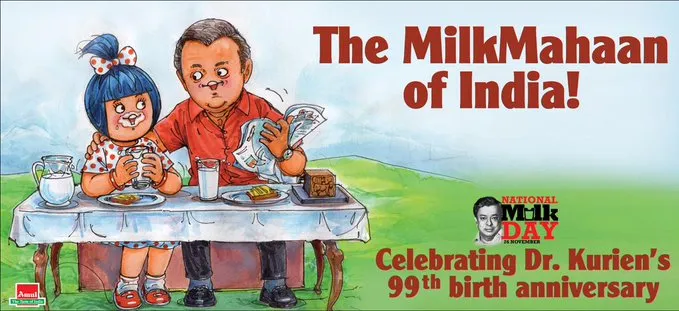National Milk Day: Dr Verghese Kurien remembered on his 99th birth anniversary
Known as the Father of White Revolution, Dr Kurien was a social entrepreneur who launched the programme Operation Flood to revolutionise dairy farming in India.
“Mero Gam Katha Pare Ja… Dhudh Ki Nadiya Wahe Ja…”
Every time we hear this folksy song from the National Award-winning film Manthan, we are reminded of Gujarat and its milkmaids, who carry pots of milk on their heads each morning to deposit it at a nearby cooperative.
The brain behind the revolutionary idea of setting up milk cooperatives across India, also known as the Anand model of dairy cooperatives, was Dr Verghese Kurien.
India celebrates National Milk Day on November 26 each year since 2014 to commemorate the birth anniversary of the Father of the White Revolution, which stands as a testament to the impact of this one man on the entire country’s milk supply.
For years now, Amul’s mascot, the Amul Girl, has been at the forefront of the company’s real-time marketing strategy. To celebrate the occasion, Amul paid tribute to him, saying, “The MilkMahaan of India!”

Image Credit: Twitter
Speaking on the occasion, Indian ad film director Prahlad Kakkar, said,
“I had the privilege of meeting Dr Kurien when I was a trainee with Mr Shyam Benegal. At the time, Shyam was doing a documentary on the National Dairy Development Board called Operation Flood, as they were in the process of setting up an entire infrastructure in Gujarat and outside of Gujarat.”
“For me, the impact of meeting somebody like him was so enormous that he has influenced a lot of things in my life. He was like my role model. He wanted to see this country actually grow into a cooperative that the world would recognise.” Kakkar said.
Dr Kurien, along with the National Dairy Development Board, started Operation Flood - a programme that transformed India from a milk deficient country to becoming the world’s largest milk producer. The idea brought small and marginal dairy farmers into the mainstream by cutting out the middle-man and giving them control of the resources that they create.
Filmmaker Shyam Benegal, who made the film Manthan inspired by the pioneering milk cooperative movement, said that Dr Kurien’s contribution to the country’s economy is a legacy that will live forever.
When the then PM Lal Bahadur Shastri, who was impressed by Dr Kurien’s work, invited him to Delhi to set up at a national scale, Dr Kurien refused, saying he wanted to stay close to the farmers.
Remembering Dr Kurien, Kiran Mazumdar Shaw, Founder of , said,
“He was someone with a vision. India is now one of the largest milk producers in the world, but more importantly, it has created this huge industrial network of value-added products, which I think, is extremely important for a country like ours.”
“I had the privilege and the pleasure of meeting Dr Kurien as a young entrepreneur. I just couldn’t help but be awe-inspired by this great man. Looking back at the wonderful meeting that I had, I wish I had a mobile phone in those days because I would have loved to take a selfie,” she added.
Several other corporate leaders, including Wipro's Azim Premji, NITI Aayog's Amitabh Kant, Infosys' Narayan Murthy, also paid tribute to the late visionary.
According to the 20th Livestock Census report published in 2019 by the Ministry of Fisheries, Animal Husbandry, and Dairying, India’s total livestock population stands at 535.78 million, showing an increase of 4.6 percent over the Livestock Census-2012.
Of this, about 192.46 million are cattle and 109.85 are buffalo, who comprise the majority of milk-producing livestock.
Dr Kurien — the architect of Amul and various other milk cooperatives across India — helped many diary farmers become self-reliant, helping generate close to 187 million metric tons in FY19, up 6.5 percent, from the previous year's 176.3 million metric tons, according to Statista.
Edited by Anju Narayanan







